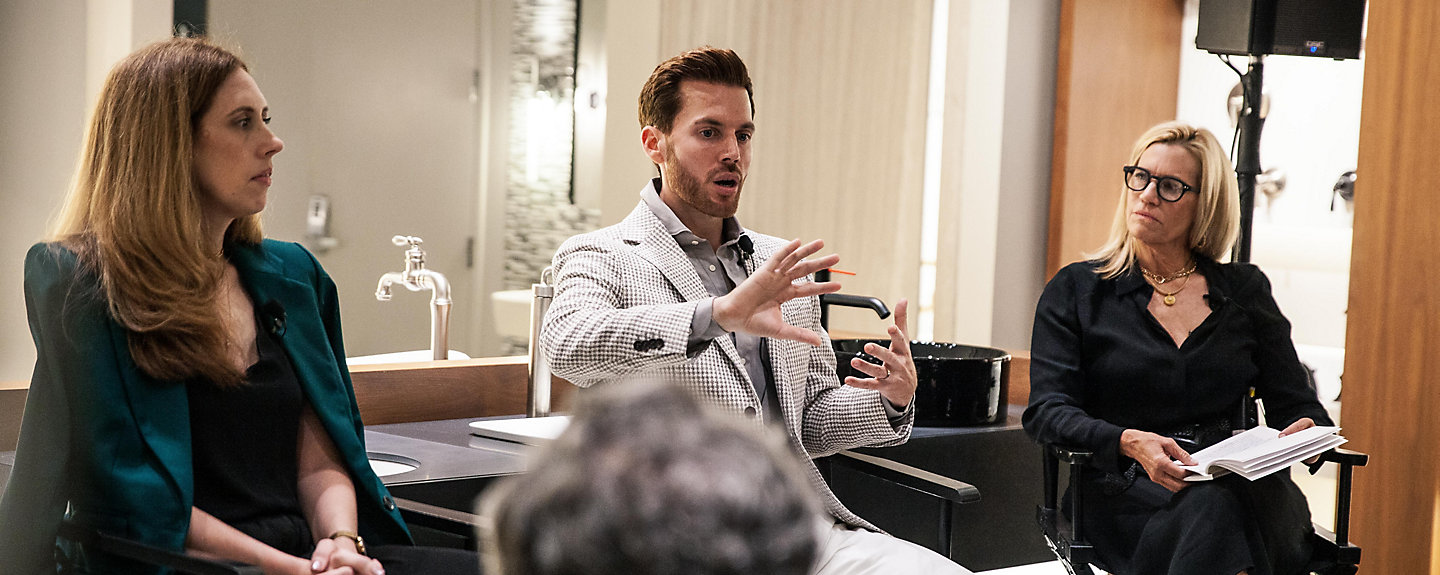
Key Takeaways from Kohler Sustainability Leaders at Climate Week
- Share:
Each year, Climate Week NYC and the United Nations General Assembly host conversations with global leaders to address the critical issues facing the world today. This year was no exception with many issues on the table ranging from education gaps caused by the pandemic, inflation and climate change. One issue that didn’t get a lot of attention, but is as critical as climate change, is the economic, social and environmental impact of our dwindling supply of safe water. Kohler changed that and convened an official Climate Week event with leading designers and architects around the “Responsibility of Design” and the important role design plays in helping to advance solutions that conserve water and unlock consumer demand for more environmentally friendly products.
Amid the backdrop of the Kohler® Experience Center in Manhattan, Laura Kohler hosted an intimate discussion with leaders from Skidmore, Owings & Merrill, FXCollaborative, and Drake/Anderson about how manufacturers, architects, and designers can better work together to prioritize progress against environmental goals, including water conservation, while also reaching and influencing end-consumers to make more environmentally sustainable choices.
Kohler environmental sustainability leaders also participated in conversations with like-minded individuals from across sectors to discuss solutions, the need for action—especially concerning water—and how we can better engage our stakeholders to drive results. Here are the main takeaways:
Use data and technology to unlock business leadership: When it comes to important business decisions, numbers speak louder than words. If we are going to successfully scale products and promote mass adoption of more sustainable options, we need real-time data on the environmental impacts of the actions we are taking and the products we are making. When business leaders see they can manufacture products that deliver on aesthetic and engineering with less greenhouse gas (GHG) or water use, they will be more inclined to expand product lines and invest in sustainable solutions.
Catapult water to the forefront of the conversation: Water underpins everything in life, yet there is very little cohesive advocacy to address the dwindling natural resource. In part this is because water is an extremely local issue and because the narrative around water challenges is fractured. Water—or lack of water—is something tangible that everyone can understand, so we must find ways to rally the global community around water to spur action in the same way that they’ve rallied around climate and GHG emissions.
Influence the influencers: Electric vehicles have recently passed the tipping point of mass adoption and we need more industries to do the same. One way to push mass adoption of sustainable choices is to empower the influencers. In our industry, designers and architects play a major role in influencing the choices people make about two of the most-used rooms in a home or building—the kitchen and bathroom. We understand as a manufacturer that it’s our responsibility to design products that are more environmentally friendly, but it’s also on architects and designers to help their customers understand the impact they can have if they purchase more responsibly.
The conversations that take place at Climate Week were empowering in that they showed how many people are dedicated to figuring out how we can adjust our habits and do business in ways that are better for the planet. While Kohler has long believed that better business and a better planet go hand in hand, it is not enough for a single industry or a single entity to take this on. Cross-sector partnerships are critical to implementing water and climate innovations at scale. To see progress, we need governments to strengthen policies and provide incentives, manufacturers to offer more environmentally friendly products across multiple prices points, trade channels to influence consumers to buy these products, and consumers to be motivated to change their behavior. We all have a responsibility and role to play when it comes to protecting our planet.